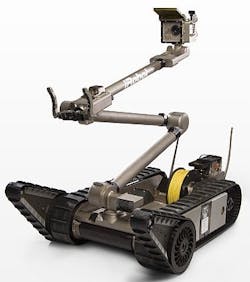iRobot to refine inflatable robotic arm to cut costs and improve performance in difficult conditions
ARLINGTON, Va., 19 Aug. 2012.Unmanned ground vehicle (UGV) designers at iRobot Corp. in Bedford, Mass., will enhance their design of an inflatable robotic arm for military applications in rough and difficult conditions.
The U.S. Army Contracting Command, on behalf of the U.S. Defense Advanced Research Projects Agency (DARPA) in Arlington, Va., plans to award iRobot a $625,000 contract to continue development in the DARPA Maximum Mobility and Manipulation (DARPA M3) Advanced Inflatable Robot (AIR) project.
iRobot specializes in a wide variety of robotic systems ranging from ground and underwater unmanned vehicles, to automatic floor scrubbers and vacuum cleaners. The company builds the U.S. Army Small Unmanned Ground Vehicle (SUGV) tactical mobile robot that gathers situational awareness in dangerous conditions for warfighters and public safety professionals.
A justification and approval announcement was posted on 8 Aug. to award the contract to iRobot under other than full and open competition because no equally qualified robotics expert can be found for the project.
The DARPA M3 AIR program seeks to find an effective low-cost way to build robots for military applications. Control of inflatable robotics provides a strong possibility of improving robotic performance in field applications while reducing the manufacturing costs, DARPA officials say. iRobot, will continue refining a robotic inflatable arm to include control and sensor functions.
The overall DARPA M3 program seeks to improve scientific understanding of how robots move over the ground and manipulate objects in natural surroundings, and improve robot manufacturing, design tools, and control algorithms.
Although military robots hold great promise for improving human effectiveness in defense operations, as well as saving lives in explosive ordinance disposal (EOD) missions, the mobility and manipulation capability of today's robots is poor, compared to humans and animals, DARPA officials point out.
If these limitations were overcome, however, robots such as unmanned ground vehicles (UGVs) could help fighting forces far more effectively than they can today across a wide range of missions, officials say.
The DARPA M3 program aims at discovering and developing fundamentally new understanding and approaches in robotics that will be applicable to many applications and environments. Technologies developed in this program also might benefit manned vehicles in capabilities such as terrain classification, stability control, and subsidence warning.
M3’s control efforts will focus on approaches using augmented teleoperation, also known as supervised autonomy, with full autonomy, cognition, reasoning, high-level decision-making, high-level decision-making under uncertainty and other higher-level cognitive functions will come later to the program.
For more information contact iRobot online at www.irobot.com/us, or DARPA at www.darpa.mil.
Follow Military & Aerospace Electronics and Avionics Intelligence news updates on Twitter
